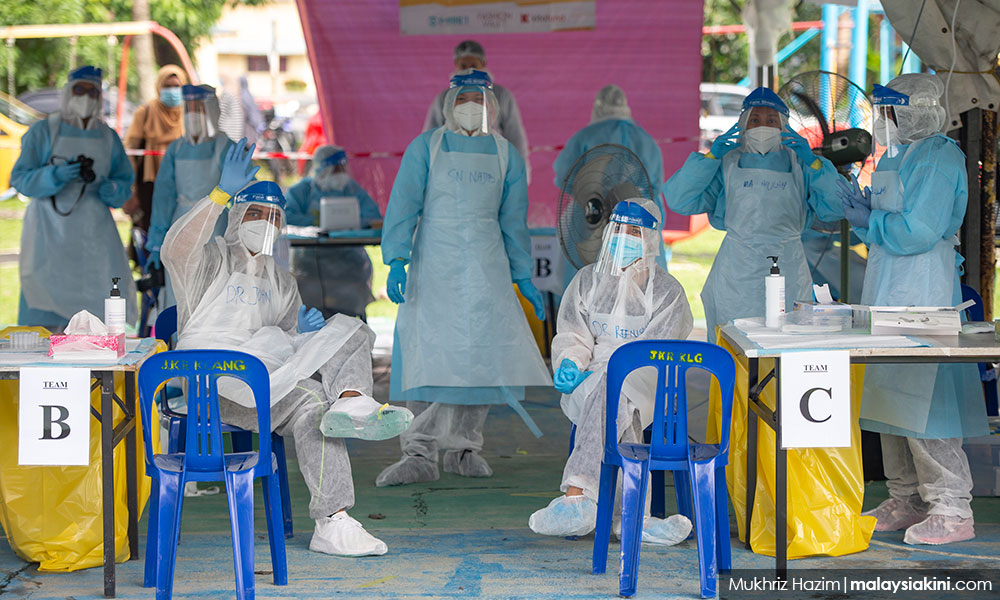Malaysians began 2020 expecting a year of transition with the anticipation of ex-premier Dr Mahathir Mohamad handing over power to PM-in-waiting Anwar Ibrahim. This was meant to go hand in hand with law reforms and a move towards a more progressive and prosperous society.
Instead, there has been endless uncertainty and manoeuvring on the political front. At the same time, the economy took an enormous hit as Malaysia joined the rest of the world in coping with the Covid-19 pandemic, which has claimed at least 1.5 million lives globally and 380 in Malaysia.
At times this year, it has almost seemed like a cruel joke that the dream of a fully developed nation under the Wawasan 2020 has seen Malaysia enter a recession following two consecutive quarters of negative growth.
Indeed while the government's Budget 2021 was planned on the basis of a swift rebounding of the economy with gross domestic product (GDP) growth of up to 7.5 percent, detractors are claiming this recession could prove to be as long-lasting and of greater impact than the mid-1980s recession and the Asian Financial Crisis of 1997.
In recent days, rating agency Fitch Ratings downgraded Malaysia's long-term foreign-currency issuer default rating (IDR) from A- to BBB+, potentially making it more expensive for the country to borrow.
Fitch said although Malaysia has moved quickly to provide relief for Covid-19's economic impact, the impact remains substantial and adds to Malaysia's already high fiscal burden, and it notably cited the ongoing political uncertainty following the Sheraton Move as among the factors for the downgrade.
A government that is constantly struggling to balance economic growth and containing the spread of the pandemic disease seems to be overly preoccupied with its own survival and has been accused of deciding on such as government-linked company (GLC) appointments and stimulus package allocations with a view to securing its own position, not the country's future.

Jury out on fourth quarter
Sunway University Business School professor of economics Yeah Kim Leng is under no illusions over the size of the task ahead.
"A recession is defined technically as two consecutive quarters of economic decline. We are, therefore, already in a recession following two consecutive quarters of economic contraction, -17.1 percent in the second quarter (Q2) and -2.7 percent in Q3.
"The strong improvement of the economy in Q3 provides a glitter of hope that the economy might emerge from the recession in Q4. However, this seems to have faded with the onset of the third Covid-19 wave," he told Malaysiakini.
Yeah did point out that due to a technicality – simply that Malaysia's terrible Q2 in 2020 gives it a low base of comparison for next year – means that we are very likely to see positive growth in Q2 next year.
"If the third wave (of Covid-19 cases) does not spiral out of control, the economy is expected to emerge from the recession next year in Q1 at the earliest or Q2 at the latest. The certainty of positive growth in Q2 2020 can be attributed in part to the low base as a result of the sharp 17.1 percent plunge in the Q2 this year."
He said that while a few countries such as China and Vietnam are expected to record positive but low growth, the global economy is mired in the worst-ever recession since the Second World War.
"For Malaysia, the projected contraction of 5-6 percent in 2020 overall is expected to be worse than during the recession (-1.5 percent) in 2009 caused by the global financial crisis but slightly better than the -7.4 percent decline in 1998 during the Asian Financial Crisis."
Still, Yeah admitted that the timing of the Fitch ratings could have been better.
"It was a surprise that Fitch pulled the trigger in the midst of the pandemic crisis. I had anticipated wrongly that they could have waited till the next rating review and see the recovery performance in what rating agencies tout as the 'through-the-cycle' approach.
"It will be interesting to see if the other two major international credit rating agencies, Standard and Poor's and Moody's Investor Service share Fitch's views.
"If so, the negative impact of the rating downgrade on Malaysia's credit costs would be more adverse. However under the current liquidity-flushed global economy and financial markets and low-interest-rate environment, the sovereign rating downgrade will have less negative impact on the country's borrowing costs and access to international financial markets," he said.

Yeah said that at this juncture, the government is still struggling with reducing the triple-digit daily new infections to double digits and the virus transmission chain is unlikely to be broken by the year-end.
"With the conditional movement control order (MCO) having been in effect in sizeable swathes of the country, Q4's GDP is expected to dip rather than improve in the absence of the third pandemic wave."
Indeed, in announcing yesterday that the government will not extend the conditional MCO in most areas, Defence Minister Ismail Sabri Yaakob cited economic pressures for the move. He said if the conditional MCO were to continue, the country's GDP would lose RM300 million each day.
Economy professor Barjoyai Bardai of Universiti Tun Abdul Razak also agrees that the impact of the ongoing third wave is difficult to gauge.
"If we go month by month, the worst time was in May with -28 percent, and June -18 percent (GDP) and then there was a pick up with July (-3.2 percent), Aug (-2.1 percent) and September still negative but less than 1.0 percent, so we can see that the economy is improving.
"The problem is we are not sure of the impact of the third wave. The Klang Valley, which accounts for 40 percent of the GDP is partially closed, and so there is a possibility our growth could see a W curve, meaning it worsens, then it improves then it worsens again.
Nonetheless, Barjoyai does not think that Finance Minister Tengku Zafrul Tengku Abdul Aziz was overly optimistic in his projection for 2021.
"To me, Zafrul's figures are reasonable. The World Bank said 6.9 percent and the IMF projected 7.9 percent.
"The problem is the government needs to use this breathing space to restructure the economy. We are too dependent on a few top 10 or 20 big corporations that are powering the economy," he said.
"We need to spread it out and develop entrepreneurship and micro businesses. From this, we will only see the impact in the medium term.
"There are some sectors like travel, hotels and tourism and transport-related that are devastated and need targeted stimulus. Elsewhere, agriculture can be a new growth source and foundation of the economy. In fact, it did not really decline, and this can be a time for the government to reduce reliance on food imports," he said.
Second-quarter disaster

Barjoyai also warned that Malaysia must not repeat the intense shut down that occurred in April and said that this was a key reason why Malaysia's Q2 negative growth rate was significantly worse than neighbours Singapore, Thailand and Indonesia.
"That MCO was a disaster, it could have been partially closed, but instead parts of the economy just collapsed. Especially, small and medium-sized enterprises and micro-businesses. If you look at Thailand, they were more strict on the border – you close that but don't close the economy. I don't think we will make that mistake again," said Barjoyai, adding that the collapse of external trade and commodity exports in the second quarter compounded the situation.
Lee Hwok Aun, Senior Fellow at ISEAS-Yusof Ishak Institute also feels that the Q2 contraction is unlikely to be repeated.
"The second quarter, Malaysia definitely hit one bottom, and the circumstances were extraordinary. The shape of Malaysia's economic recovery remains to be seen – whether V, U, or even W, which is the scenario involving a second downturn.
"But even if there is a slow and fluctuating recovery, I doubt that contraction of such magnitude (-17.1 percent) will repeat," he told Malaysiakini.
Nonetheless, he is not expecting the positive growth rate in this year's Q4.
"The GDP quarterly percentage changes are calculated year-on-year to account for seasonal variations. Q3 2020 in generating RM350 billion of output, registered -2.7 percent change compared to Q3 2019.
"It will be very challenging for this year's Q4 to recover into positive terrain, which will require the economy to generate more than RM370 billion, the output of Q4 2019, amidst continuing global economic uncertainty, lockdowns, and more Covid-19 surges.
"The rise in Employment Insurance Scheme unemployment benefit claims growth from 15,600 at end-March to 91,000 at end October, also reflects the economic downturn and continuing hardships for many," he pointed out.
Redefine the bottom line
Lee believes that Malaysia should view the situation as a chance to refine the national bottom line.
"We cannot hinge policy on GDP or the stock market index, especially on a quarterly basis, but look at a broader range of socioeconomic anchors and longer-term objectives, including education, health and household well-being.
"Even though the GDP might bounce back, families who have lost income, and children struggling to cope with distance learning, may suffer more lasting adversities," he said.
"Of course, the economy must be stimulated back into action, through consumption and investment (private and public), and exports.
"Decisions should be guided by principal objectives of generously safeguarding welfare and putting money in people's pockets, continuing job protection, education and training, and more selective investment in productive and innovative ventures," added Lee.
Safe vaccine still the key

Most countries are coming to grips with the 'lives versus livelihood' approach in dealing with the pandemic pending the rollout of a safe vaccine that is expected towards the year-end or early next year, says Yeah.
"With the rising hope of a safe and effective vaccine being available soon, the bottom is expected to be the current Q4.
"A worst-case scenario is a longer duration that takes up Q1 2021 to suppress the virus coupled with a delayed rollout of the national immunisation programme," he said.
Even before the vaccine is ready, he said localised or cluster-based containment strategies rather than total economic shutdown are a must.
"Effective containment strategies such as quick testing, tracing and quarantine of new infections, coupled with adherence to health safety protocols such as avoidance of large gatherings, wearing masks and personal hygiene are being applied without the need for total economic shutdown.
"Containment strategies must also be applied to ensure that hospital capacity for treating severe cases is not breached while livelihood and economic activities in the rest of the country can continue while observing the pandemic protocols," he added. - Mkini




No comments:
Post a Comment
Note: Only a member of this blog may post a comment.